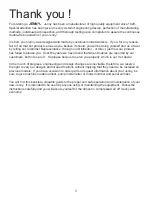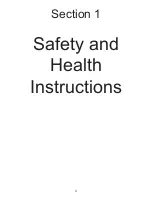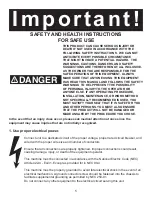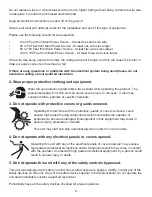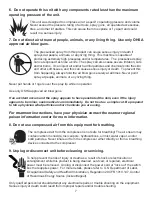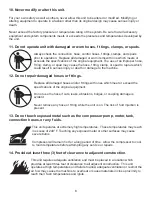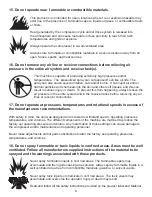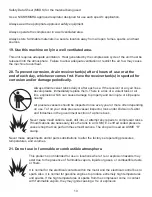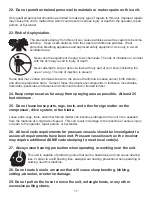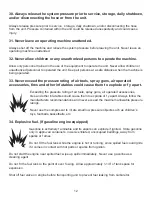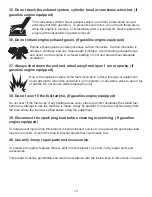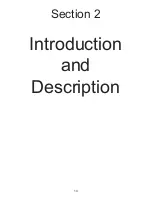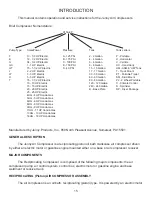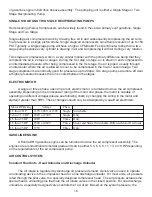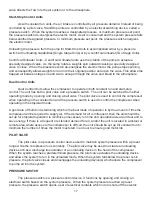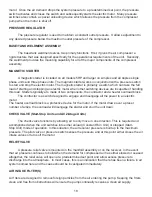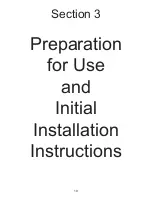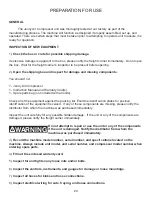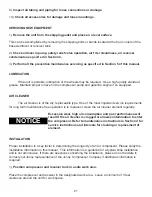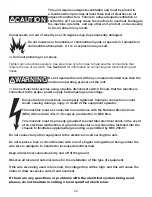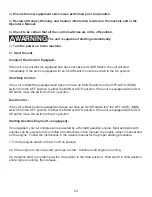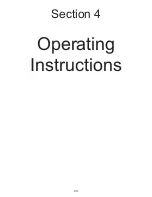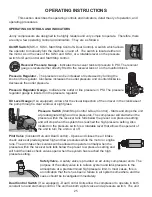
10
Safety Data Sheet (MSDS) for the material being used.
Use a NIOSH/MSHA approved respirator designed for use each specif c application.
Always wear the appropriate approved safety equipment.
Always operate the compressor in a well ventilated area.
Always store f ammable materials in a secure location away from all open f ames, sparks, and heat
sources.
19. Use this machine only in a well ventilated area.
This unit requires adequate ventilation. Heat generated by the compression cycle of the unit must be
released into the atmosphere. Failure to allow adequate ventilation or restrict the air f ow may cause
the machine to overheat.
20. To prevent corrosion, drain receiver tank(s) after 4 hours of use or at the
end of each day, whichever comes f rst. Have the receiver tank(s) inspected for
corrosion and/or damage periodically.
Always drain receiver tanks daily or after each use. If the receiver or any air lines
develop leaks, immediately replace them. There is a risk of a violent tank or air
line explosion which can cause damage to property and can injure or kill people
nearby.
All pressure vessels should be inspected once every year or more often depending
on use. To f nd your state pressure vessel inspector, look under Division of Labor
and Industries in the government section of a phone book.
Never make modif cations, weld, drill into, or attempt any repairs to compressor tanks.
If modif cations are necessary, take the tank to an A.S.M.E. certif ed coded pressure
vessel shop that can perform these modif cations. The shop will need an ASME “R”
stamp.
Never make adjustments and/or parts substitutions to alter the factory set operating pressures,
temperatures, and volumes.
21. Do not use in f ammable or combustible atmosphere.
This product is not intended for use in locations where f re or explosion hazards may
exist due to the presence of f ammable vapors, liquids or gases, or combustible dusts
or f bers.
It is normal for the electrical contacts within the motor and the electrical control box to
spark. Also, it is normal for gasoline engines to produce extremely high temperatures
and sparks. If the high temperatures or sparks from the compressor come in contact
with f ammable vapors, they may ignite causing a f re or explosion.
Summary of Contents for Reciprocating Air Compressors
Page 4: ...4 Section 1 Safety and Health Instructions...
Page 14: ...14 Section 2 Introduction and Description...
Page 19: ...19 Section 3 Preparation for Use and Initial Installation Instructions...
Page 24: ...24 Section 4 Operating Instructions...
Page 36: ...36 Section 5 Maintenance Instructions...



